The Wild Reciter: Poetry and popular culture in Australia 1890 to the present
Kirkpatrick’s work is both accessible and elegant as he traverses a diverse literary landscape to offer a completely original interpretation of our shared history of poetry. Critically, this history is woven into many other histories of people, places and cultural moments.
READ REVIEW
↓
The Wild Reciter: Poetry and popular culture in Australia 1890 to the present
Peter kirkpatrick | 2024
From the extraordinary pen of poet and historian Peter Kirkpatrick comes a new volume that tells one of the many stories of poetry in Australia. Poems have a habit of polarising readers (and writers). Yet, poetry once dominated our popular culture, made easily accessible via a vigorous Australian publishing industry and a desire to educate the citizenry of the colony, as well as the ready acceptance of poetry as performance.
In fact, there was once such enthusiasm for poetry recitals, that the wild reciter devouring the limelight in the pages of this book could be heard in professional and personal settings across the continent. As Kirkpatrick points out: ‘the wild reciter represents poetry’s neglected and—in the best possible sense of the word—vulgar past, offering a perspective that might also speak to its present and future as a democratic art’ (p. 2). I do believe that reading aloud to someone is a gift, and I adore being read to. But to recite something, to tell a story—familiar or new—of crime, love, sex, of the extreme and the mundane: that’s next level. The idea of poetry recitals drawing crowds across the country feels both egalitarian, romantic and, well yes, a tad wild.
Kirkpatrick’s work is both accessible and elegant as he traverses a diverse literary landscape to offer a completely original interpretation of our shared history of poetry. Critically, this history is woven into many other histories of people, places and cultural moments. From the ideas that see poetry as essential to our basic education, through to this art form’s connections to music, television, film and other literary genres. This research was always going to be important, but it does feel especially timely. As the humanities brace for another round of attacks launched from bunkers that seem to only offer protection for accountants, bureaucrats and miscellaneous disciples of the concept of a monetary return on an investment, poetry is as vital as it ever was. Even the most right-leaning capitalists will whip out a poem for a wedding or a funeral. For this reason, given poetry’s pull to the right and the left, I see poems as the canaries in the coal mine. If we lose them then there is no oxygen left and we really are all in trouble.
There are poets discussed here that many readers will recognise. Indeed, as Kirkpatrick notes: ‘Since the days of the wild reciter, recognition is half the pleasure—recognition that invites reaffirmation of those things that we collectively know or value or love or hope for’ (p. 298).
That said, it’s not all bush ballads and the Australiana that has been soldered onto the curriculum and often taught for the purposes of improving the elocution of children more interested in other entertainments or, perhaps, as a class contribution for a low-budget, end-of-school-year concert. (I hold a vague memory of having to write out A.B. Patterson’s The Man from Snowy River—very, very neatly—in order to receive my pen licence.) Patterson’s poem, first published in The Bulletin in 1890 and re-imagined as a film in 1982, is generally considered quintessentially Australian. Yet, here we are asked if inspiration for ‘The Man’ was actually found in an American cowboy. This is done in a way that forces us to reconsider the assumed origin story of a text so famous it is ‘a household word today’ just as the final stanza claims. So, yes, the canon is here and unpacked, but there are a few surprises as well. No, I did not have ‘John Laws in a Text about Poetry’ on my 2025 bingo card.
The division of 130 years into 13 chapters offering a survey of poets such as C.J. Dennis and Lesbia Harford, through to Clive James and Dorothy Porter, facilitates a reading experience that allows you to start at the beginning and progress to the concluding discussion on poetry slams, laureates and bestsellers. Or, allows the pursuit of a topic of particular interest. In an age that often sees the index as superfluous (or perhaps, just in acknowledgement of the cost of paper as a modern-day luxury) this book benefits from a detailed index that allows readers to find material, including individual poets and poems, quickly.
So many ideas of class, gender and identity could easily make for an overwhelming and quite messy account of poetry. But, Kirkpatrick has used his extensive knowledge of literature in Australia to offer a story that highlights and explains while offering new ways to appreciate and understand how we have engaged with poetry from the penny readings of the 1800s through to poetry-as-performance events of today. Yes, poetry still polarises; it can be confronting, it can be hard work, or it can just come across as a bit snotty. As The Wild Reciter clearly proves, this art form is more than any single stereotype. With its multitude of personalities, poetry was—and remains—very much for all of us.
The Wild Reciter: Poetry and popular culture in Australia 1890 to the present is published by Melbourne University Publishing.
Reviewer: Rachel Franks, PHA (NSW & ACT)

